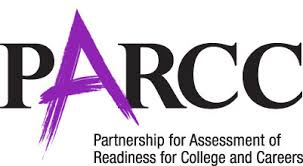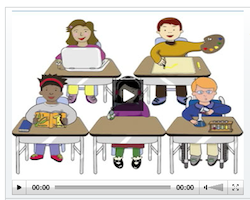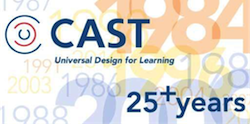UDL and the Common Core
High stakes testing season is upon us. One purpose of testing, we’re told, is to assess what students know and to guide them to be ready for their future.
Students with disabilities are provided support through individualized testing accommodations that ensure that their disability does not interfere with their ability to access the information and to express what they know. The idea is to make the general education curriculum and assessment procedures accessible to all students.
Makes sense, right? But it’s not that simple. Accommodations are onlytruly supportive if the curriculum and instruction that came before the assessment was accessible to these students in the first place. That means high quality teaching that guides students with disabilities to build their knowledge base and readiness skills.
The Partnership for the Assessment of Readiness for College and Careers (PARCC) has released a draft accommodations manual that provides the types of accommodations that may be applied to support students with disabilities and English-language learners to express their knowledge and skills during the administration of the high stakes tests now being developed around the Common Core standards.
To begin development on the Manual, PARCC carefully analyzed the Common Core State Standards (CCSS) and the claims on the PARCC Performance-Based and End-of-Year assessment components in both mathematics and English language arts/literacy, conducted a policy scan on currently available accommodations across all PARCC states, and synthesized the most current research on accommodations for SWD and ELs. – from the PARCC Frequently Asked Questionsdocument.
PARCC seeks public feedback by providing a forum for people to review the documents and comment. (All comments must be submitted by May 13, 2013.) A final draft will be created in June.
Some acceptable accommodations highlighted in the draft
 PARCC identifies five categories related to “equitable access”:
PARCC identifies five categories related to “equitable access”:
1. Presentation. Any changes in the formatting of the test or the test questions. For example, the use of Braille or sign language.
2. Response. Any changes in the method that the student responds to the questions. This may include use of a scribe.
3. Timing and Scheduling. Includes allowing students to have more time to complete the test, allowing breaks.
4. Setting. Includes taking the test in a location with minimal distractions, a separate location, and/or smaller group size.
5. Expanded access. Includes additional accommodations for a small number of students who meet certain criteria to require additional support in the areas of reading, writing, and calculating.
The PARCC draft also includes a number of universal design for learning features that expand accessibility for all students either by a student’s choice or at the discretion of school personnel. For example, computerized pop-up glossaries, spell-checkers, or magnification of text will be available. Check out the draft manual to see the full extent of accommodations.
As long as the accommodations do not interfere with the skills being assessed, then the accommodations will be allowed. But I can’t stop thinking about my original question: What are we really accommodating? If the goal is to assess how well students are mastering the Common Core, then let’s take a look at what this means for instruction.
No meaningful accommodation without meaningful instruction
Remember, test accommodations are only supportive if the instruction that leads up to the assessment is alsoaccessible. Otherwise, what happens is this…
• Students never really read the passages because they do not have the strategies, the decoding skills, fluency skills, comprehension skills, or the stamina to get through the reading meaningfully.
• Students just answer the questions to answer the questions. Frequently they do this haphazardly, randomly, and as quickly as they can because they just want to be done.
• Students get discouraged during the test because they do not know how to apply their background knowledge base — and often times, this base is too limited to apply independently.
So in these cases, I ask you…what do the extra time or separate setting provisions really accommodate? In some cases it just gives students extra time to struggle. Extra time to feel frustrated. Extra time to feel anxious, tense, and eventually apathetic.
Basically, no matter how much we accommodate to make these tests accessible, classroom instruction must be clear, consistent, and accommodating each day. The Common Core curriculum must be accessible to students with disabilities and English language learners daily in order for the testing accommodations to serve their true purpose during annual testing season.
Whatis“HighQualityInstruction”?
 For starters, watch this four minute video, UDL At a Glance, to give you the basis for what Universal Design for Learning is all about. Next, you should explore The Center for Applied Special Technology (CAST). It is a nonprofit educational research and development organization that works to make learning accessible for all students through Universal Design for Learning.
For starters, watch this four minute video, UDL At a Glance, to give you the basis for what Universal Design for Learning is all about. Next, you should explore The Center for Applied Special Technology (CAST). It is a nonprofit educational research and development organization that works to make learning accessible for all students through Universal Design for Learning.
CAST has clearly defined the principles and practices of UDL, which support instruction and assessments. Adopting a UDL mindset within our inclusion classrooms can definitely provide some answers to pressing questions about how all teachers can make daily instruction accessible. Why wait for the test?! It’s all about three things: providing (1) multiple means of representation, (2) multiple means of engagement, and (3) multiple means of expression to expand learning opportunities for all students.
I’m on a mission to bring this UDL mindset to the teams of teachers I work with — and to help create a district-wide framework to make daily instruction accessible for all students in inclusive settings. I’ve taken some small steps this year, and I’m excited for the steps ahead! More on that another time…
PARCCstillseeksfeedback
So when we think about the testing accommodations, clearly we must consider daily instruction. How are these students gaining access to Common Core-related instruction each day so that the testing accommodations are meaningful for them?
 There’s still a little time on our side. PARCC is inviting the public’s feedback on their accommodations draft. CAST has already responded and their valued opinion can be seen here for writing accommodations and here for their response to reading accommodations.
There’s still a little time on our side. PARCC is inviting the public’s feedback on their accommodations draft. CAST has already responded and their valued opinion can be seen here for writing accommodations and here for their response to reading accommodations.
Remember — you have until May 13, 2013 to add your voice–just click here.
And when you think about how to kick up instruction to help students with disabilities and English language learners access the Common Core through high quality daily instruction–comment on this blog and keep our discussion going. We have so much to learn from each other!


You need to be a member of School Leadership 2.0 to add comments!
Join School Leadership 2.0